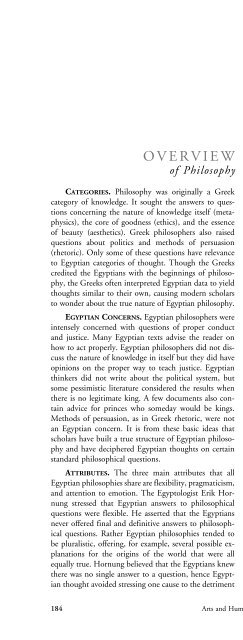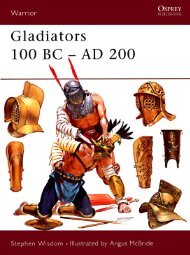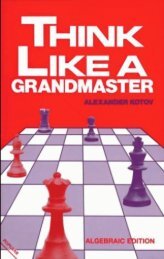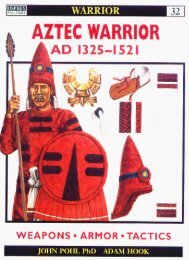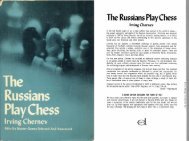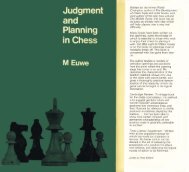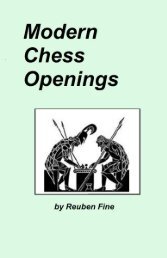Through the Eras
Edward Bleiberg ed., Ancient Egypt (2675-332 ... - The Fellowship
Edward Bleiberg ed., Ancient Egypt (2675-332 ... - The Fellowship
You also want an ePaper? Increase the reach of your titles
YUMPU automatically turns print PDFs into web optimized ePapers that Google loves.
OVERVIEWof PhilosophyCATEGORIES. Philosophy was originally a Greekcategory of knowledge. It sought <strong>the</strong> answers to questionsconcerning <strong>the</strong> nature of knowledge itself (metaphysics),<strong>the</strong> core of goodness (ethics), and <strong>the</strong> essenceof beauty (aes<strong>the</strong>tics). Greek philosophers also raisedquestions about politics and methods of persuasion(rhetoric). Only some of <strong>the</strong>se questions have relevanceto Egyptian categories of thought. Though <strong>the</strong> Greekscredited <strong>the</strong> Egyptians with <strong>the</strong> beginnings of philosophy,<strong>the</strong> Greeks often interpreted Egyptian data to yieldthoughts similar to <strong>the</strong>ir own, causing modern scholarsto wonder about <strong>the</strong> true nature of Egyptian philosophy.EGYPTIAN CONCERNS. Egyptian philosophers wereintensely concerned with questions of proper conductand justice. Many Egyptian texts advise <strong>the</strong> reader onhow to act properly. Egyptian philosophers did not discuss<strong>the</strong> nature of knowledge in itself but <strong>the</strong>y did haveopinions on <strong>the</strong> proper way to teach justice. Egyptianthinkers did not write about <strong>the</strong> political system, butsome pessimistic literature considered <strong>the</strong> results when<strong>the</strong>re is no legitimate king. A few documents also containadvice for princes who someday would be kings.Methods of persuasion, as in Greek rhetoric, were notan Egyptian concern. It is from <strong>the</strong>se basic ideas thatscholars have built a true structure of Egyptian philosophyand have deciphered Egyptian thoughts on certainstandard philosophical questions.ATTRIBUTES. The three main attributes that allEgyptian philosophies share are flexibility, pragmaticism,and attention to emotion. The Egyptologist Erik Hornungstressed that Egyptian answers to philosophicalquestions were flexible. He asserted that <strong>the</strong> Egyptiansnever offered final and definitive answers to philosophicalquestions. Ra<strong>the</strong>r Egyptian philosophies tended tobe pluralistic, offering, for example, several possible explanationsfor <strong>the</strong> origins of <strong>the</strong> world that were allequally true. Hornung believed that <strong>the</strong> Egyptians knew<strong>the</strong>re was no single answer to a question, hence Egyptianthought avoided stressing one cause to <strong>the</strong> detrimentof ano<strong>the</strong>r. Egyptians did not believe in absolutes. Egyptianphilosophy is also pragmatic. Egyptian teachings consideredconcrete life situations without generalizing toabstract laws. The Egyptian notion of maat (“justice”)stressed solutions to real-life problems. Abstract thoughtwas not as important as finding a practical solution to aspecific problem. The wisdom that older men offered to<strong>the</strong>ir children spoke directly to specific situations <strong>the</strong>yexpected would occur in <strong>the</strong> course of any career or life.Finally, Egyptian thought recognized <strong>the</strong> lure of emotion,but advised against submitting to transitory feelings.It might seem odd to modern Western cultures that<strong>the</strong> Egyptians believed that <strong>the</strong> heart was <strong>the</strong> organ ofthought. Yet Egyptian philosophers advised that <strong>the</strong>silent man who ignored his emotions and who thoughtbefore he acted was <strong>the</strong> ideal. The opposite of <strong>the</strong> silentman was <strong>the</strong> heated man, one who immediately submittedto his emotions without giving adequate thoughtto his actions. Much of Egyptian philosophy counseledagainst impulsive action without thought.RELIGION. It is difficult to separate Egyptian philosophicalideas from religion. Maat stood at <strong>the</strong> center ofall Egyptian life, including both philosophy and religion.Maat itself was a goddess and in some periods had a temple.Maat was also part of <strong>the</strong> god’s food, a way of statingthat all <strong>the</strong> gods’ survival depended on maat’s existence.Establishing maat also was essential to <strong>the</strong> world’s creationby a god. When <strong>the</strong> god created order from chaos,<strong>the</strong> god established maat. In <strong>the</strong> same way, <strong>the</strong> kingmaintained maat in <strong>the</strong> world and thus kept chaos fromovercoming <strong>the</strong> Egyptian way of life. Finally, individualsobeyed <strong>the</strong> king and thus established maat in <strong>the</strong>world. A person’s success in life completely depended onfollowing and creating maat. Thus religion, politics, andphilosophical concerns were bound in an intricate webof concepts.MISUNDERSTANDINGS. The ancient Greeks were<strong>the</strong> first people from a Western culture to write about <strong>the</strong>ancient Egyptians, beginning in <strong>the</strong> fifth century B.C.E.Greek perceptions of Egypt dominated Western understandingof <strong>the</strong> culture, especially before J.-F. Champolliondeciphered hieroglyphs in 1822 C.E. Because <strong>the</strong>Egyptian pictoral language was unavailable to Westernscholars for hundreds of years, Egyptologists were completelydependent on Greek and later Roman writers toform an opinion of Egyptian culture. Even after modernEgyptology allowed <strong>the</strong> ancient Egyptians to speakfor <strong>the</strong>mselves, Greek notions continued to influencemodern perceptions of Egyptian philosophy. Nowhereis this more obvious than in modern approaches toEgyptian thought, science, and spirituality. Many mod-184 Arts and Humanities <strong>Through</strong> <strong>the</strong> <strong>Eras</strong>: Ancient Egypt (2675 B.C.E.–332 B.C.E.)


